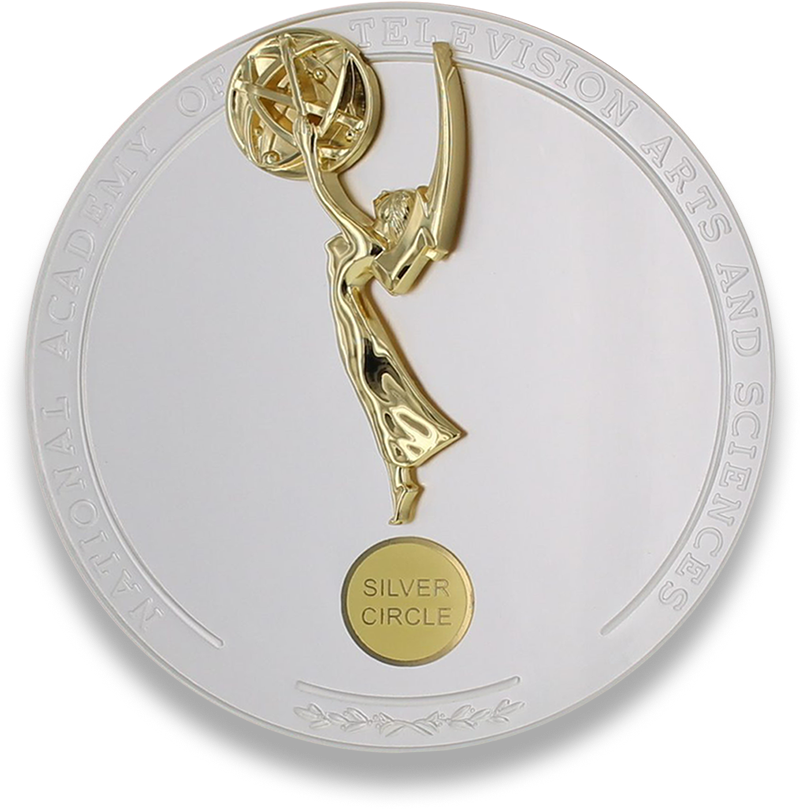
CHICAGO / MIDWEST
Honorees
1993
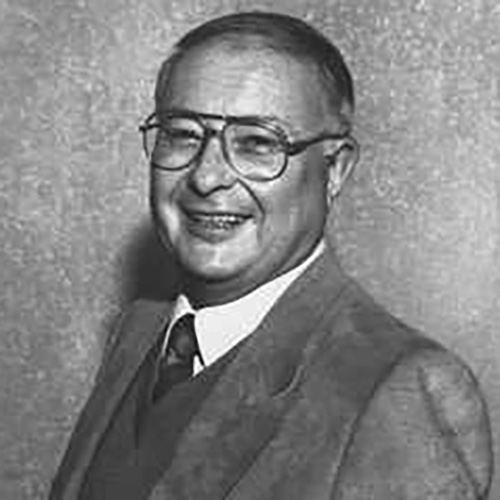
Roy Brown
Text from Chicago Tribune
Roy T. Brown played Cooky the Clown, longtime sidekick to Bozo the Clown and the clown on the "The Bozo Show" and was most likely to get a pie in the face or water poured down his pants.
As Cooky, Mr. Brown was the earnest ne'er-do-well always getting outsmarted by Bozo. He cheerfully endured hundreds of hurled cream pies, constant trickery that kept him from leading the closing Grand March and disparaging remarks about lousy circus food during a run that began when Mr. Brown invented Cooky in 1968 and ended (more or less) with his 1994 retirement.
He was a puppeteer before joining the Bozo cast, playing the title character in the children's TV show "Garfield Goose and Friends," and creator of some of that show's most enduring characters, including Romberg Rabbit. For "Ray Rayner and His Friends," and later on "The Bozo Show," he provided the voice of Cuddly Dudley. He was still on "Garfield Goose" when he created Cooky the Cook, parlaying an acquaintance with Bozo producer Don Sandburg into an audition for the program when Sandburg (who then played Bozo's sidekick Sandy the Tramp) announced he was leaving the show.
"He was talented in the classic sense--he knew the old vaudeville routines just marvelously," said Allen Hall, longtime producer of "The Bozo Show." In addition to being inducted into the Clown Hall of Fame, Mr. Brown won a Chicago/Midwest Emmy® Award in 1992 and was later named to the Chicago Chapter of the National Academy of Television Arts & Sciences' Silver Circle. Mr. Brown died from congestive heart failure Monday, Jan. 22, 2001.
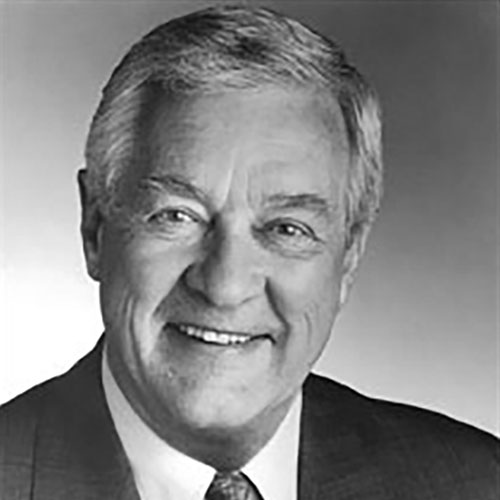
Floyd Kalber
From Benson High School Alumni Site:
A television news anchorman on NBC's "Today" show and on two highly rated programs in Chicago, he received five Emmy® Awards. After attending Creighton University, he got his start in broadcasting at KGFW Radio in Kearney. He was a newscaster and head of the news department at KMTV - Channel 3 in Omaha for 11 years before joining NBC in Chicago in 1960. Kalber left WMAQ-TV in Chicago in 1976 after 16 years as the 10 p.m. anchorman to appear on the "Today" show in New York. He left that position after three years to work as a network correspondent with NBC until 1981, when he retired. He came out of retirement in 1984 to help revive Chicago's WLS-TV, anchoring its evening newscast. He enjoyed another run of 14 years with top ratings and retired from the ABC affiliate in 1998. He was nicknamed "the Big Tuna" because his aura and power in the newsroom were perceived to be as great as the late Chicago mob boss Tony "Big Tuna" Acardo. Kalber served in the Army in the South Pacific during World War II. Falber died in 2004.
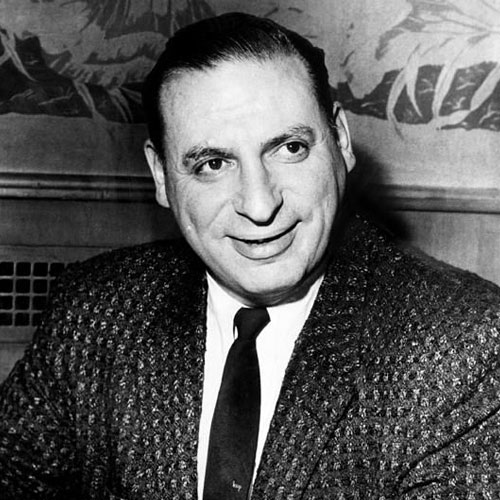
Irv Kupcinet
From Wikipedia:
Irving "Irv" Kupcinet (July 31, 1912 – November 10, 2003) was an American newspaper columnist for the Chicago Sun-Times, television talk-show host, and radio personality based in Chicago, Illinois. He was popularly known by the nickname "Kup".
His daily "Kup's Column" was launched in 1943 and remained a fixture in the Sun-Times for the next six decades.
Kupcinet was youngest of four children born to Russian Jewish immigrants in the North Lawndale neighborhood of Chicago. While attending Harrison Technical High School, he became editor of the school newspaper and the senior class president. He eventually won a football scholarship to Northwestern University, but a scuffle with another student led to his transferring to the University of North Dakota.
Upon graduating college, Kupcinet was signed by the Philadelphia Eagles football team in 1935. His football career was cut short due to a shoulder injury, which led him to take a job as a sports writer for the Chicago Daily Times (now known as the Chicago Sun-Times) in 1935.
While writing his sports column, Kupcinet also wrote a short "People" section which became officially known as "Kup's Column" in 1948, after The Chicago Sun and the Daily Times merged to form the Chicago Sun-Times. "Kup's Column" chronicled the nightlife of Chicago, along with celebrity and political gossip. The column would eventually be distributed to more than 100 newspapers around the world.
In 1952, Kupcinet became a pioneer in the television talk show genre when he landed his own talk show. In 1957, he was one of the set of hosts who replaced Steve Allen on The Tonight Show, before Jack Paar was brought in to change the program's format. Kupcinet's own series ran from 1959 until 1986 and was, at one point, syndicated to over 70 stations throughout the United States. The series garnered 15 Emmy® Awards along with a Peabody Award.
In addition to writing his newspaper column and talk-show hosting duties, from 1953 to 1977 Kupcinet provided commentary for radio broadcasts of Chicago Bears football games with Jack Brickhouse (and was affectionately mocked for the signature phrase, "Dat's right, Jack").
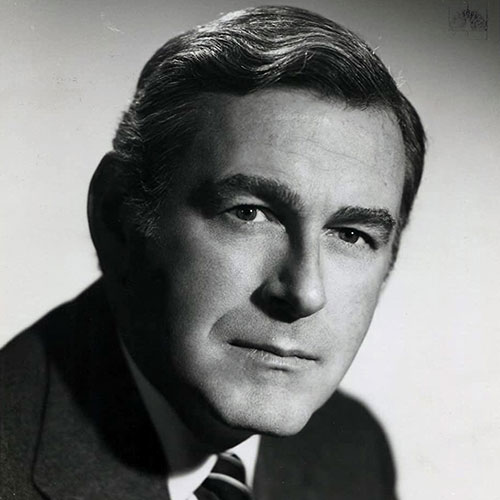
Bob Mulholland
From the Northwestern Medill Website:
Mulholland received his bachelor’s degree at Northwestern in 1955 and his master’s in 1956. After serving for two years in the U.S. Army in Korea, his career was spent in broadcasting, most of it with NBC. He joined NBC in 1961 as a news writer in the network's Chicago station, WMAQ-TV. Twenty years later, he was named president and chief operating officer of the entire company. In the intervening years, Mulholland worked in the NBC News London bureau; was the Washington producer for the well-known "Huntley-Brinkley Report;” was director of news for KNBC, the NBC-owned station in Los Angeles; was executive producer of the "NBC Nightly News with John Chancellor;” and was executive vice president of NBC News.
“Bob’s contributions to Medill are still seen today through our outstanding broadcast journalism program,” said Medill Dean Charles Whitaker. “His legacy lives through all the students who use his lessons to share some of today’s most important stories. We will forever be thankful for his talent and tenacity, and grateful that he chose to share it with Medill.”
Mulholland was named president of the NBC network in 1976, and in 1981, he was promoted to president and chief operating officer, assuming additional responsibility for the company's five owned television stations, as well as the news, sports and radio divisions. He left NBC in 1984.
Mulholland returned to his alma mater in 1988, where he is credited with revamping and revitalizing Medill’s broadcast program.
David Nelson, associate professor emeritus and Mulholland’s colleague and friend, recalled, “A grin that welcomed you as a friend. A heart open to all. A commitment to journalistic accuracy and fairness. And an exceptional intellect sprinkled with curiosity. Bob Mulholland was special. Really special.
“I got to know him for 50 years, he admirably remained the same person – in the board room, in the classroom, on the golf course or tennis court. And, oh, did I mention his sense of humor? About 20 years ago Bob and I helped Dillon Smith drive his antique Bentley from Chicago to Naples. I drove. Dillon directed. Bob sat in the luxurious back with teak table down, food and beverages at the ready. Several times cars and even trucks would slow down to see who was in this Rolls Royce. Dillon would say: ‘Bob, another one’s coming up on the left and looking.’ Bob would grab the Grey Poupon mustard jar from the table, hold it out the window and flash that smile that could stretch from New York to Los Angeles. We played like high school kids all the way to Florida.”
While at Medill, Mulholland was named in the 1952 and 1953 Syllabus yearbooks as one of the top members of the varsity rifle team. At the time, he chose a letter blanket instead of a jacket, but upon returning to Medill to teach, he decided he would like a jacket.
“How many faculty members have an NU letter jacket?” he told the Daily in September of 1989, adding, “Now I can’t wait for the cold.”
That same year, Mulholland spearheaded the expansion of Medill’s quarter-long externship program, then called Teaching Newspaper, to include television stations. He was adamant that the students have a chance to do real broadcast work, telling the Daily Northwestern, “I would like them to go to smaller stations where they will do everything. I don’t want them to go into Chicago where they’ll just stand and watch.” The first five students were placed into television stations in the fall quarter of 1990.
It was also during Mulholland’s tenure that a new studio building was constructed in partnership with the School of Speech, now School of Communication. The building, John J. Louis Hall, opened in the fall of 1991 and featured a state-of-the-art broadcast studio for Medill students, complete with fold-out bleachers so students could watch the productions and carrels for the student reporters to write their stories.
“Bob and I have been friends from the time we met at Medill in 1956,” said friend and MSJ classmate Al Borcover. “From the outset, he was a friendly, professional, humble, funny guy. He was a great scrounger. Shortly after he joined the Medill faculty, I recall that he was able to get a satellite dish (I believe from WGN) to provide live feeds for his students, and an anchor desk that was being discarded by Channel 5. Bob was always a hands-on guy. He was a pro at Medill, WGN, NBC and throughout his life.”
In the spring of 1992, Mulholland spoke to a group of Northwestern students in the Communications Residential College. His talk, “Television in the year 2000,” covered five decades of TV history and included some prophetic forecasts for the future. Accurately, he predicted that fiber-optic cable would create thousands of available channels and total viewer control. “New technology may also allow viewers to ‘punch up’ any program they want, at any time of the day, for a fee,” Mulholland told the students.
Medill Professor Emeritus Donna Leff headed the search committee for Mulholland’s replacement. “Bob Mulholland was a consummate broadcast professional who brought distinction, honor and considerable joy to Medill,” Leff said. “Although famous, and truly accomplished at the highest levels of network television when network television was the industry’s gold standard, Bob was a dedicated, accessible and beloved teacher.”
He retired from Medill in 1993 and was inducted into the Medill Hall of Achievement’s inaugural class in 1997.
Mulholland is survived by his wife, Judith, of Naples, FL, daughter, Leslie (Leigh) Anderson (Chris) of Amherst, NH, son, Todd Mulholland (Licet) of Naples, FL and stepsons, Michael Holleran of Warrenton, VA and Matthew Holleran of Menlo Park and San Francisco, CA and seven grandchildren.
Mulholland met Judith while he was working at Medill after NBC. Shortly after, they both retired and moved to Naples, Florida.
About their joint retirement, Judith said, “We took up golf, something neither of us had tried before, and Bob discovered gardening. He loved working in the yard. He enjoyed creating beds of plants, many of which he shared with others and others shared with him. On March 23, we will have been married 30 years.”
About his distinguished career, Judith said, “Bob had an exciting career at NBC, eventually becoming President. During his years there, he helped launch the careers of Tom Brokaw, Bryant Gumbel and Tom Snyder. He negotiated Johnny Carson’s contract in Johnny’s kitchen after one difficult season, just the two of them.”
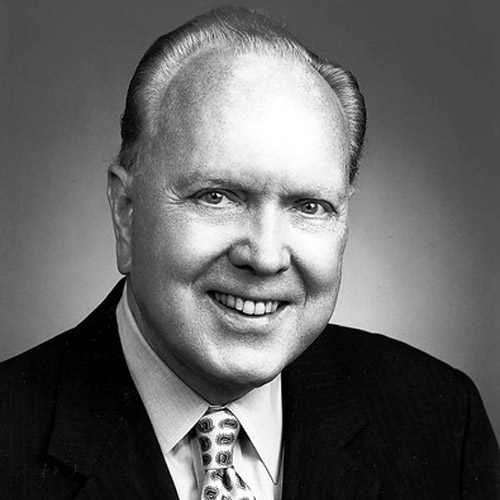
Ward Quaal
From TV News Check:
Legendary broadcast pioneer and former WGN Chicago President Ward Quaal died late Friday, Sept. 24, in a Chicago nursing home at the age of 91.
“Free and local broadcasting was built by a handful of visionary giants, but few stood taller than Ward Quaal,” National Association of Broadcasters President Gordon Smith said today in a statement. “During his long and storied career, Ward Quaal built WGN into an institution whose impact extended far beyond Chicago, and he counted as friends even those who occupied the Oval Office. NAB extends our sympathy to the Quaal family and we mourn the passing of this broadcast pioneer.”
Ward Louis Quaal was born in 1919. His first radio experience came while he was in high school in Ishpeming, Mich., when he worked as an announcer, writer and salesman for WBEO (now WDMJ) in Marquette, Mich., 15 miles away. In 1937 he enrolled at the University of Michigan and worked for WJR Detroit, announcing sports, moderating a youth forum and handling commercial and sustaining programs.Quaal graduated on June 7, 1941, and joined WGN(AM) the following day, working on special events and sports announcing. He served in the U.S. Navy for three years, eventually overseeing a large radio installation in Norfolk, Va., before returning to WGN in December 1945 as special assistant to the general manager. In this capacity, he was instrumental in developing WGN’s farm and public affairs departments and also worked on developing plans for WGN’s expansion into television (WGN-TV went on the air in April 1948). At the same time, Quaal was taking law courses at Northwestern University at night.
From 1949 to 1952, Quaal took a leave of absence from WGN to become executive director of the Clear Channel Broadcasting Service, an industry group based in Washington. There, he worked closely with Louis C. Caldwell, a legendary attorney, radio pioneer and Washington counsel to the Tribune Co.
He then joined the Crosley Broadcasting Corp. in 1952 as assistant general manager. The following year he was named vice president and general manager of Crosley’s radio, television and international shortwave stations.